Book Digest: September 24, 2007
From David Plante’s new novel, ABC:
It seemed to Gerard that the trance he was in raised him above himself, so that he saw himself as if from a higher level, leaning closer and closer to read the book as the room became dim; saw himself and saw the room and saw other rooms of the house, then saw the house from the outside; he saw the roofs of neighboring houses, saw the streetlights go on along the streets lined with dark maple trees, saw the lights of the downtown of Manchester go on, saw the river reflecting the lights. And while on that level Gerard saw to the great circle of the horizon, still pale on the west with the light of the falling sun and becoming pale to the east with the light of the rising moon, on the lower level of himself hunched over the dictionary, squinting to see, he was concentrating on the entries he read as he had never before concentrated. It seemed to him that the invisible lines he was sure zigzagged about the room, connecting the disparate objects in the room, were zigzagging not only from entry to entry on the page, but through the pages, connecting rugs, clothes, food from all over the world, and, more, connecting the tribes, civilizations, races, which the rugs, clothes, food, were the product of—tribes, civilizations, races that spoke Khuzi, Khowar, Khond, spoke Khaskura and Kharia, spoke Maori. On the level of himself reading, hardly able to see, he was absolutely certain that every entry in the dictionary, over three thousand pages of them in tiny print, connected with every other. And on the level of himself, now looking down at the whole, revolving Earth, he was absolutely certain that everything in the world interconnected.
Autonauts of the Cosmoroute by Julio Cortázar and Carol Dunlop, translated by Anne McLean
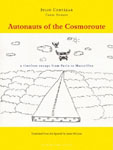
Argentine writer Cortázar(Hopscotch, Blowup), who died of leukemia in 1984, wrote Los autonautas de la cosmopista with his wife Carol Dunlop on a 33-day trip from Paris to Marseilles. Normally such a trip would not take that long, but for this effort the writers stopped at two rest areas a day. In a gesture of revolutionary solidarity, Cortázar bequeathed the copyright to the Nicaraguan Sandinistas. That’s all I am going to say about this—need I say—unusual book.
Tender as Hellfire by Joe Meno
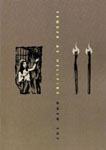
Chicagoan Meno (The Boy Detective Fails, Hairstyles of the Damned), a past winner of the hallowed Nelson Algren Prize for Short Fiction, has had his 1999 trailer-park paean republished. Two brothers, Dough and Pill, whose lives are set in a wacky and tenuous world, complete with requisite oddballs (see the “Undisputed King of the Tango”), view life through a distorted lens. Which is of course where the most interesting stuff is found.
» Read an excerpt from Tender as Hellfire
The Shock Doctrine: The Rise of Disaster Capitalism by Naomi Klein

If you haven’t been frightened or upset by the machinations of your government (assuming you live in a First World country), you are either one of the plutocrats benefiting from its deviations, were raised by hyenas, or have succumbed to the moronizing effect of consuming HDTVs and larger kitchen appliances. Klein does make some links—shock to the society, torture to individuals—but if the aftermath of Katrina and Operation Shock and Awe didn’t raise a bad smell in your nose, no amount of evidence and argument will convince you otherwise. On the other hand, if you can stomach this much bad news, you may be (read: ought to be) moved to become an engaged citizen. I hope you are.
» Read an excerpt from The Shock Doctrine
An Arsonist’s Guide to Writers’ Homes in New England by Brock Clarke

Clarke (The Ordinary White Boy) apparently likes trippy titles, and this one predictably (if not appropriately) raised some hackles. This hybrid novel tells the story of convicted arsonist Sam Pulsifer (he burned down the Emily Dickinson House), which reaches a boiling point when the homesteads of Robert Frost, Edith Wharton, Herman Melville, and Nathaniel Hawthorne are torched. Sam becomes the main suspect, and thus he is obliged to find the real culprit. If you can get past the dark side of this title, it’s a smart and funny book.
» Read an excerpt from An Arsonist’s Guide to Writers’ Homes in New England
The Water Cure by Percival Everett
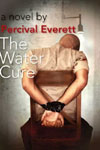
Everett (Erasure) is an imaginative storyteller and a fine writer whose 11 novels cut across a broad stripe of American life. His latest novel is an internal, first-person view of an unrepentant murderer. For concision, I like the caption that accompanies one of the book’s reviews: “A freewheeling writer spins an elliptical, eccentric protest novel.” And in case you are wondering what he is protesting, that would be George W. Bush.
The Coldest Winter: America and the Korean War by David Halberstam

Halberstam had just completed this book when he lost his life in an automobile collision earlier this year. Apparently he felt it was his magnum opus, a culmination of his long and well-regarded career. Out of respect for that, a number of friends and professional peers are doing book events around the country to publicize this detailed history of the Korean War. Just as his book The Best and the Brightest was a formidable key to grasping the Vietnam War, the Coldest Winter is a skillful illumination of the politics and mistakes that embroiled the U.S. in this so-called police action. Halberstam brings this important and neglected piece of the American foreign policy vividly to life.
» Read an excerpt from The Coldest Winter
Ron Carlson Writes a Story by Ron Carlson
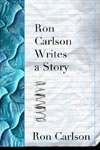
Besides eight story collections to recommend his writing, there was his guest-editing stint for Ploughshares and an engrossing introduction to that issue that made it clear to me Carlson can make any subject interesting and inviting. Which is how I came to cite this “story of a story”—essentially a writer’s how-to piece. It’s an enjoyable read, and one that may benefit your own writing.
Thomas Paine’s Rights of Man: A Biography by Christopher Hitchens

This offering is from the Atlantic Monthly Press’s “Books that Matter” series, and for this one the loquacious Hitchens is a perfect choice. Frankly, I can’t remember if Paine is considered a founding father (that designation I believe is reserved for Constitution and Declaration of Independence signatories), but he is as formidable and influential as any other of the anointed. Paul Collins wrote a quirky book a while ago that makes Paine’s life as vivid and important as his more bibliographically celebrated peers. Hitchens’s concise explication is the obvious bookend—not to mention he is always really fun to read.
Vanilla Bright Like Eminem by Michel Faber

Faber is much traveled; he was born in Holland, moved to Australia when he was seven, and now lives in Scotland. His second novel, The Crimson Petal and the White, was internationally celebrated, and this newest offering is a 16-story collection that sustains his reputation as an engaging and proficient teller of tales.
» Read an excerpt from Vanilla Bright Like Eminem
Diaries 1969-1979: The Python Years by Michael Palin

Intrepid journalizer Palin, who was a member of Monty Python, publishes his diaries of the years leading up to the formation of Python and how John Cleese, Graham Chapman, Terry Jones, Terry Gilliam, and Eric Idle came together to form that group. Palin reveals the efforts to sanitize the shows for American broadcast and the efforts behind the making of The Holy Grail and Life of Brian. Palin is a riveting raconteur and includes much fascinating detail about his family and friends. Considering that Palin is one of the funniest men alive, this is a diary chock-a-block with chuckles and charm.
» Read an excerpt from Diaries 1969-1979
The Most Arrogant Man in France: Gustave Courbet and the Nineteenth-Century Media Culture by Petra ten-Doesschate Chu
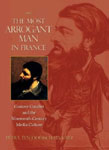
This title and its author’s name were hard to ignore—ten-Doesschate Chu, who edits Nineteenth-Century Art Worldwide, writes a clear-eyed account of French artist Courbet, making a strong case for his being one of the first modern artists to master promotion and publicity (not unlike a 19th-century Andy Warhol or Damien Hirst). Courbet’s pioneering horn-tooting also shows the transformative period he lived in, as mass media was beginning to infiltrate all areas of culture. This study is a well-lit window on the intersection of commerce and mid-19th-century high culture.
» Read an excerpt from The Most Arrogant Man in France
The Boys From Dolores: Fidel Castro’s Classmates From Revolution to Exile by Patrick Symmes

As the triumphant Cuban Revolution follows a TS Eliot script (ending with a whimper not a bang), this fascinating account tells about the elite social milieu from which the Castro brothers came. Symmes (Chasing Che) writes the story of the Colegio de Dolores, a Jesuit boarding school that Fidel and Raul attended. There is much of interest in this book—especially if, like me, you are fascinated by Cuba—including a more vivid picture of Raul, who will likely head the Cuban government when Fidel passes and who has stewarded the country during Fidel’s recent illness. Most importantly, this book is a powerful antidote to the agenda-driven, true-believing, reactionary braying that seems ever-present in American news accounts.
Venceramos!
» Read an excerpt from The Boys From Dolores
ABC by David Plante
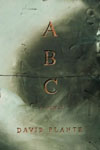
Plante (The Francoeur Trilogy) writes a harrowing story of such anguish and grief that, had he not taken it in a totally unexpected direction, I might not have tolerated it. For the fainthearted (like me): A child dies and the grieving father sets out on a most unlikely journey to come to some kind of understanding of it—well, I leave that to you, if you can. Plante has written a dozen novels and is a critic’s darling—which makes sense, as he can write good sentences and hang a well-told story on them. Like Stephen Dixon’s Interstate, John Burnham Schwartz’s Reservation Road, and Siri Hustvedt’s What I Loved (all involving the death of a child), Plante walks a narrow and slippery line here.
» Read an excerpt from ABC
